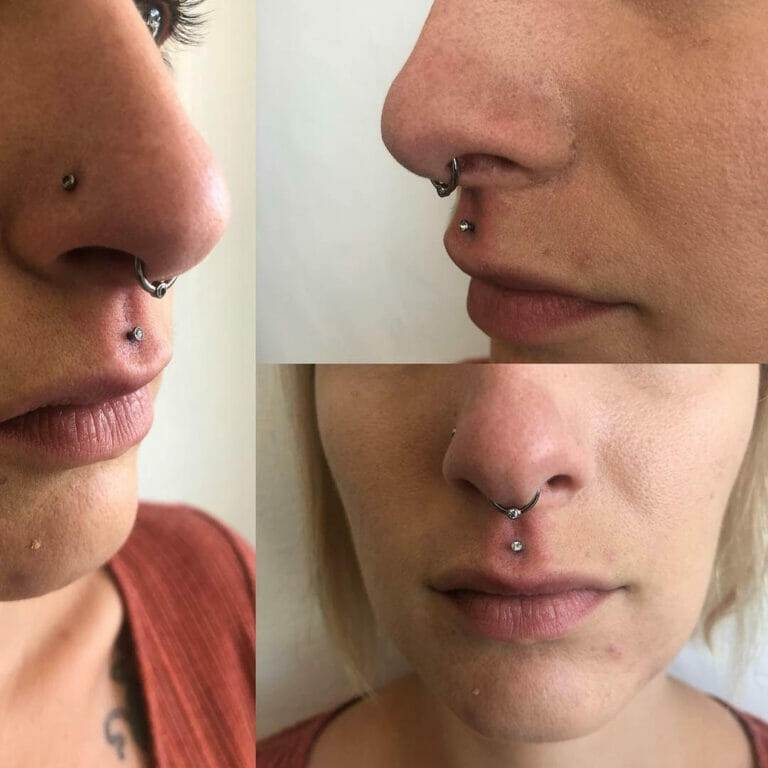Body modification has been a part of human culture for centuries. From ancient tribal rituals to modern-day piercings and tattoos, people have used body modification as a form of self-expression and empowerment. The act of modifying one’s body can be a powerful way to assert one’s individuality and create a unique identity. In this article, we will explore the world of piercings as a popular form of body modification in modern times, their cultural significance throughout history, the benefits they can bring for self-empowerment, and how to navigate workplace policies and stereotypes surrounding piercings.
Piercings as a Form of Self-Expression
In recent years, piercings have become increasingly popular as a form of self-expression. People of all ages and backgrounds are getting piercings to showcase their individuality and personality. Whether it’s a simple earlobe piercing or an elaborate arrangement of multiple piercings, each one tells a unique story about the person wearing it.
Piercings allow individuals to express themselves in ways that may not be possible through other means. They can be seen as a form of wearable art, with each piercing serving as a canvas for self-expression. People choose different types of piercings based on their personal style, interests, and beliefs. For example, someone may choose a nose piercing to showcase their rebellious nature or a helix piercing to display their love for all things celestial.
The History of Piercings and Their Cultural Significance
Piercings have a rich history that spans across different cultures and time periods. They have been used as symbols of status, spirituality, or rebellion in various parts of the world. In ancient Egypt, for example, both men and women wore earrings as a symbol of wealth and social standing. In some African tribes, lip plates were worn by women as a sign of beauty and femininity.
In other cultures, piercings have been used for spiritual or religious purposes. For instance, nose piercings have been a common practice in India for centuries and are often associated with Hinduism. In Native American cultures, piercings were used as a way to connect with the spiritual world and were often accompanied by rituals and ceremonies.
In more recent history, piercings have been associated with rebellion and counterculture movements. In the 1970s and 1980s, punk subcultures embraced body modifications, including piercings, as a way to challenge societal norms and express their nonconformity.
The Benefits of Piercings for Self-Empowerment
Getting a piercing can be a transformative experience for many individuals. It can be a form of self-empowerment that allows them to take control of their bodies and express themselves authentically. Piercings can help individuals feel more confident and comfortable in their own skin.
For some people, getting a piercing is a way to reclaim their bodies after experiencing trauma or feeling disconnected from themselves. It can serve as a reminder of their strength and resilience. For others, it may be a way to mark a significant life event or milestone, such as a graduation or the end of a relationship.
Piercings can also be a source of empowerment through the act of self-care. Taking the time to research and choose the right piercing, finding a reputable studio, and properly caring for the piercing afterward can all contribute to a sense of self-worth and self-love.
Overcoming Stereotypes and Misconceptions About Piercings
Despite the growing acceptance of body modifications in society, there are still many stereotypes and misconceptions surrounding piercings. These stereotypes can be harmful and perpetuate negative judgments about individuals with piercings.
One common stereotype is that people with piercings are rebellious or unprofessional. This stereotype can lead to discrimination in the workplace and other social settings. Another misconception is that individuals with piercings are somehow “less than” or not as intelligent as those without piercings.
To overcome these stereotypes, it is important for individuals with piercings to challenge these assumptions through their actions and behavior. By being confident, professional, and knowledgeable in their respective fields, they can break down these stereotypes and show others that piercings do not define a person’s abilities or character.
Finding the Right Piercing Studio in San Diego

When considering getting a piercing, it is crucial to find a reputable piercing studio that prioritizes safety and hygiene. In San Diego, there are many studios to choose from, but not all of them may meet the necessary standards.
To find a reputable piercing studio in San Diego, it is important to do thorough research. Look for studios that have positive reviews and recommendations from previous clients. Check if the studio follows proper sterilization procedures and uses high-quality jewelry. It is also essential to ensure that the piercer is experienced and knowledgeable about different types of piercings.
Visiting the studio in person before getting a piercing can also provide valuable insights into their professionalism and cleanliness. Take note of the overall cleanliness of the studio, including the piercing area and the tools used. A reputable studio will be transparent about their practices and answer any questions or concerns you may have.
The Importance of Proper Aftercare for Piercings
Proper aftercare is crucial for the healing process of a new piercing. Neglecting proper aftercare can lead to infections, prolonged healing times, and other complications. To ensure a successful healing process, it is important to follow the aftercare instructions provided by the piercer.
After getting a new piercing, it is essential to keep the area clean and free from bacteria. This can be done by gently cleaning the piercing with a saline solution or a mild soap recommended by the piercer. Avoid touching the piercing with dirty hands and refrain from changing the jewelry until it is fully healed.
It is also important to avoid activities that may irritate or damage the piercing, such as swimming in pools or hot tubs, using harsh chemicals on the piercing area, or sleeping on the piercing. Following these aftercare guidelines will help prevent infections and promote proper healing.
Choosing the Right Piercing for Your Lifestyle and Personality
Choosing the right piercing is a personal decision that should be based on your lifestyle, personality, and personal preferences. There are various types of piercings to choose from, each with its own meaning and symbolism.
For example, a septum piercing can be a bold statement of individuality and rebellion, while a tragus piercing can be a subtle and elegant way to showcase your style. A tongue piercing can be seen as playful and adventurous, while a daith piercing can be a symbol of spirituality and inner strength.
Consider your daily activities and how they may impact your choice of piercing. If you have a physically demanding job or participate in contact sports, you may want to choose a piercing that is less likely to get caught or injured. Additionally, think about how the piercing will fit into your overall style and aesthetic.
Navigating Workplace Policies and Piercings
Workplace policies regarding piercings can vary greatly depending on the industry and company culture. Some workplaces may have strict policies that prohibit visible piercings, while others may have more lenient guidelines.
If you are considering getting a piercing and are concerned about workplace policies, it is important to familiarize yourself with your company’s dress code and policies regarding body modifications. If there are specific restrictions on piercings, consider whether you are willing to compromise by choosing less visible piercings or using retainers that make the piercing less noticeable.
If you are unsure about the policies or have concerns about how your piercings may be perceived, it is best to have an open and honest conversation with your employer or supervisor. Explain your reasons for wanting a piercing and address any concerns they may have. By approaching the conversation with respect and professionalism, you may be able to find a compromise that allows you to express yourself while still adhering to workplace policies.
Embracing Your Unique Self Through Piercings
In conclusion, piercings can be a powerful form of self-expression and empowerment. They allow individuals to showcase their individuality, personality, and beliefs. Throughout history, piercings have held cultural significance in different parts of the world, serving as symbols of status, spirituality, or rebellion.
Getting a piercing can be a transformative experience that helps individuals feel more confident and comfortable in their own skin. However, it is important to navigate workplace policies and stereotypes surrounding piercings with grace and professionalism.
By embracing our unique selves through piercings and other forms of body modification, we can celebrate our individuality and create a world that values diversity and self-expression. So whether you choose a simple earlobe piercing or an elaborate arrangement of multiple piercings, wear it proudly and let it be a reflection of your true self.
If you’re interested in body modification as a form of self-expression, you’ll definitely want to check out this article on the growing popularity of piercings and their positive impact on self-expression. It explores how piercings can empower individuals to embrace their unique style and personality. Whether you’re considering a simple earlobe piercing or something more exotic like facial piercings, Embellish PB in San Diego has got you covered. Discover the transformative power of piercings and how they can help you express yourself authentically. Read more here.






